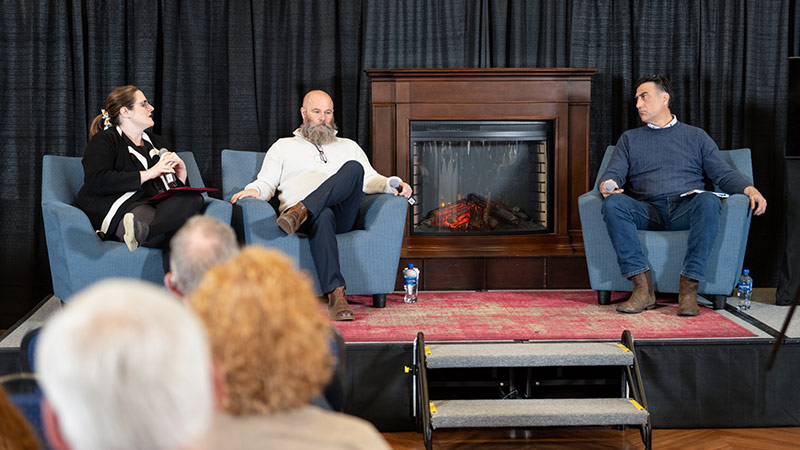Housing Futures: Solutions for homelessness and affordable housing
Author: Tim Jaques
Posted on Apr 10, 2024
Category: UNB Fredericton , UNB Saint John

Leaders highlighted the urgency of finding sustainable solutions to homelessness and ensure access to affordable housing at the Shaping the Debate: Housing Futures symposium on April 4 and 5 hosted by the University of New Brunswick (UNB).
UNB’s Shaping the Debate initiative enables important conversations with the goal of building a more prosperous and just future for New Brunswick. Employing dialogue and roundtable discussions, Shaping the Debate provides a platform for the critical exchange of views to ensure positive action to benefit communities, the economy, and lives of New Brunswickers.
Against the backdrop of rising demand and limited resources, the latest symposium emphasized the need for collaborative action, leadership and innovative solutions to address the root causes of the housing crisis. Taking part were leaders from UNB and the community, as well as provincial and municipal politicians.
On April 4 at the Student Union Building ballroom, a panel discussion and question period were moderated by Dr. Julia Woodhall-Melnik, an associate professor with the department of social science and principal investigator at the Housing, Mobilization and Engagement Research Laboratory (HOME-RL) at the UNB Saint John campus. HOME-RL engages in applied research and experiential education focused on reducing housing and health inequities in Atlantic Canada.
The panelists were Seth Asimakos, a social entrepreneur who spearheaded a Saint John project to replace a tent encampment with small housing units made from shipping containers, and Chris Gorman, director of data and impact at the Human Development Council in Saint John.
Gorman said specialized housing models are needed that are not “cookie cutter,” as different communities need different approaches to housing because they each have unique needs. Some people might otherwise feel isolated from the community they previously enjoyed.
Asimakos said shipping containers are better than tents, but not ideal. He suggested using tax surpluses to increase proper affordable housing, a shortage which has grown with the province’s population.
“There is a lever there they can use. They aren’t using it the right way.”
Both Gorman and Asimakos agreed that besides investment in housing units, rent control and similar tenant protections along with universal basic income would help those most at risk.
On April 5 at the Wu Conference Centre, Dr. Erin Dej, an assistant professor in the faculty of human and social sciences at Wilfrid Laurier University, spoke on homelessness in mid-sized cities and addressing the prejudices and misconceptions about it.
Hidden homelessness, such as staying in unsafe relationships or couch surfing, receives little public attention, while visible homelessness, such as tents and encampments, leads to public anger at the unhoused.
Dej said attempts to address homelessness through shelters and other forms of housing and services are met by NIMBYism that is not rooted in evidence and data, but in misconceptions and fear of change. These are spread and amplified on Facebook groups.
She said the programs themselves should not be open to negotiation, but proponents should attempt to address specific neighbourhood concerns.
NIMBYs often voice concern about “the community.” Dej suggested emphasizing that the unhoused in mid-sized and small cities are mostly locals and appealing to a sense of community to gain acceptance.
“Let’s lean into that narrative, and make it work for us,” she suggested.
Speaking after Dej, Dr. Tobin LeBlanc Haley, an assistant professor of sociology at UNB, acknowledged the difficulty of engaging in these conversations, but said they were important.
“We know that this crisis is here. We know that we are seeing increased visibility.”
Dr. Paul Mazerolle, UNB president and vice-chancellor, moderated a panel discussion and question period featuring Fredericton mayor Kate Rogers, Miramichi mayor Adam Lordon, and Saint John deputy-mayor John MacKenzie.
The three said municipalities are dealing with the affordable housing shortage as best they can, even though municipalities often lack the funds and the legal means to be fully effective. They are the closest level of government to the problem, and thus well placed to address it.
The mayors agreed more needed to be done to assure citizens about necessary changes in addressing the need for more housing - particularly affordable housing - and assisting the unhoused.
They would like the process to include positive and not just negative feedback to proposed developments as part of the legal record, as well as more legal powers for municipalities regarding housing.
All were optimistic that the challenge could be met with leadership and the right resources.
Photo: Dr. Julia Woodhall-Melnik, Chris Gorman and Seth Asimakos.
